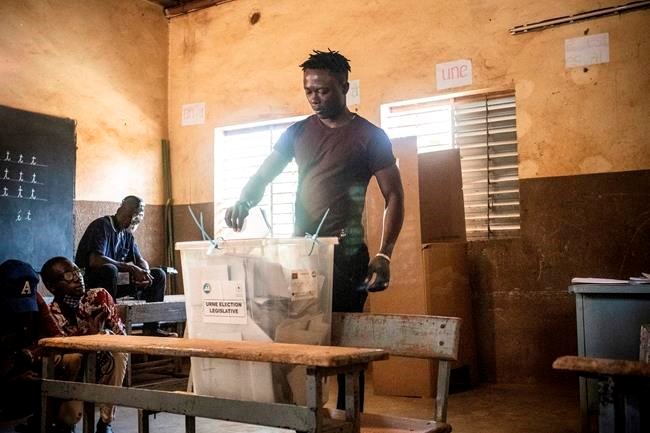OUAGADOUGOU, Burkina Faso — Fears of attacks by extremists prevented voting in many parts of Burkina Faso on Sunday, as the country went to the polls for presidential and legislative elections marred by ongoing violence linked to al-Qaida and the Islamic State group.
Election and local government officials told The Associated Press that certain polling stations in the Center North, Sahel and East regions that were expected to open had not, and those that did had to close early because of the fear of attacks.
Two polling stations in the capital, Ouagadougou, also didn't open, according to Halidou Ouedraogo, president of Codel, a local organization monitoring the elections. He wouldn't elaborate on why.
Some towns weren’t able to conduct voting at all, including Bartiebougou and Tin Akoff, where 14 soldiers were killed in an ambush by IS earlier this month, Newton Ahmed Barry, president of the National Independent Electoral Commission, told a news conference Sunday.
“The reasons are mainly security and also it’s impossible to find someone to manage the polling stations,” Barry said. Even if the army can secure the area, the electoral commission didn’t have staff willing to go there, he said. Other poll stations remained closed because people were threatened and told that if they voted and put ink on their fingers, they can “say goodbye to their finger,” he said.
While the elections that did take place were for the most part peaceful, observers worry what might happen after the election given that so many people were prevented from voting.
“It’s not clear yet how people will react vis-a-vis the people elected, because they have not voted ... Will the population accept the people elected despite the fact that all of them didn’t vote?” said Julien Oussou, regional
This election is a major test for the nation’s young democracy in the face of rising extremist attacks. Burkina Faso experts say the violence and intimidation show how limited the authorities’ control and legitimacy really are.
Whoever “wins (the election) will confront the challenge not just of restoring security, but also showing Burkinabe that every citizen matters,” said Alex Thurston, assistant professor of political science at the University of Cincinnati in the United States.
President Roch Marc Christian Kabore has promised to secure the country and is vying for another five years against 12 other candidates. Kabore is expected to win, but the opposition hopes to split the vote, depriving him of the 51% support needed for an outright victory in the first round. Then it plans to form a coalition behind the strongest opposition candidate for the second round.
Violence has displaced more than 1 million people and cut off swaths of the country, preventing at least 166,000 new voters from being able to register, according to election officials.
A change in Burkina Faso’s electoral code this year means that election results will be valid even if people can’t vote in parts of the country.
Opposition candidates accused the ruling party of fraud, including bribing people. The parties also accused the National Independent Electoral Commission of making changes to the electoral map, said Zephirin Diabre, a leading candidate from the Progress and Change Party.
After voting today in Ouagadougou, he told the media that he will congratulate whoever the winner is, but “won’t accept results that are stained with fraud and irregularities.”
Even though voter turnout wasn’t high, according to estimates by some observers, dozens of people lined up at polling stations in Ouagadougou, before sunrise.
Oumar Zorome, 55, was the first to vote in the city’s Patte D’Oie district and is backing Kabore, who he says has built roads and in not responsible for the country’s struggles with extremists.
“I’m voting for the change in this country that’s already been taking place to continue,” he said.
Voter Paul Lengane, however, said he’d vote for an opposition candidate because there has been too much corruption and insecurity.
“My expectations in the last five years were not met so I want to try something new,” he told AP.
With police guarding polling stations, poll worker Habibata Ouedraogo said everything was running smoothly so far but she was concerned about the insecurity.
“I’m worried that a voting station could be targeted,” she said.
Kabore urged citizens to vote as he cast his ballot Sunday.
“I’m calling on all Burkinabe not to be lazy and go vote. It’s about the development of Burkina Faso, it’s about peace in our country, so it’s important that each Burkinabe vote,” he said.
Diabre is one of the main challengers, together with Eddie Komboigo, head of the Congress for Democracy and Progress, the party of former President Blaise Compaore, who was ousted by a popular uprising in 2014.
“We are convinced that the CDP will return to power,” Komboigo said Sunday. “If we return to power it won’t be to retaliate, but to meet the needs of the population, bringing back security as soon as possible.”
Results are expected in the next few days.
___
AP reporter Arsene Kabore in Ouagadougou, Burkina Faso, contributed to this report.
Sam Mednick, The Associated Press



